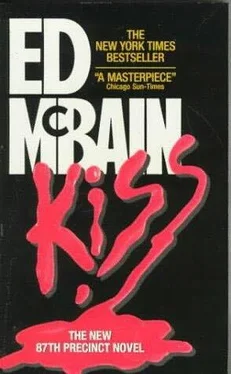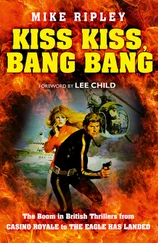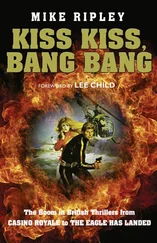"Yes, he told me he has a gun.”
"He's got one, all right," Meyer said.
"A Colt forty-five, which he bought from a small-time dealer in Diamondback. Guy named Gofredo Cabrera, who also put him in touch with someone who rented him a room downtown.”
"Yes, he told me he was living somewhere near the Calm's Point Bridge.”
"321 South Lewiston," Meyer said, nodding. "Apartment 4C.”
"Anyway, we figured if we requested a search warrant for the gun, it'd be denied,”
Carella said. "Insufficient cause-we were already turned down on a telephone tap. So all we can do, really, is keep an eye on him, make sure he ...”
"Keep an eye on him?”
"Yes. Ask the lieutenant to ...”
"But how?”
“Well, get some detectives assigned ...”
"But he's gone.”
Both of them almost missed the beat.
Emma kept running as if she hadn't just dropped a bombshell. They kept running beside her, flanking her, each turning to look at her.
"Back to Chicago," she said.
"How do you know?" Carella asked.
"He told me he was leaving. He said with Tilly dead, my husband saw no further need for his services.”
"When did he tell you this?”
"Yesterday afternoon.”
"And you think he's already gone?”
"He told me he was catching a plane late last night.”
"To Chicago?”
"Yes. To Chicago.”
"Shook hands, said goodbye ...”
"No, nothing that formal. Just came by to say he'd be leaving, it'd been a pleasure working with me, he hoped everything turned out all right. But you know ...”
They waited.
"I believe you, of course, I'm not suggesting that your information is wrong. But I think he really was a private detective, and I think he really was trying to protect me. I don't know why he used a false name, if he did ...”
"He did," Carella said.
"... but perhaps there was a reason for it. In any case, he's gone now. So even if he did pose a threat-which I doubt-he no longer does.”
"Unless he was lying," Carella said.
"Did he say which flight he was taking?”
Meyer asked.
"No," Emma said. "But, really, why would he ...?was "To put you off guard," Carella said.
"I think you're wrong. I think he was here to do a job, and when my husband told him he was no longer needed, the job ended.”
They had reached a Stop sign at the end of the road. Carella figured they'd come at least a mile and a half from her building. The sign was obviously a turnaround point for her. As if obeying it, she stopped for an instant, breathing hard, head lowered, sucking in great gulps of air. At last, she looked up at them. Apparently continuing her thought of a moment ago, she said, "Things do begin, you know ... and then they end.”
"Well," Carella said, and for a moment didn't know quite what else to say. "If you should need any further assistance ...”
"No, I'll be fine," she said. "I'll be alone this weekend, but with Tilly dead ...
well, I'm sure there's nothing to worry about anymore.”
"Just in case you should need us," Meyer said, "you know where we are.”
"Thank you," she said, "I appreciate that.”
There was a small, sad smile on her face.
The superintendent at South Lewiston told them he wasn't in the habit of checking on the comings and goings of his tenants and didn't know whether the man in apartment 4C was still there or not.
Nobody had told him anybody was leaving, and it wasn't none of his business anyhow.
"Do you have a passkey to that apartment?" Meyer asked.
"I do, but ...”
"Think you could let us in, take a look around?" Carella asked.
"Not without a search warrant," the super said.
"Five, ten minutes is all we'd need,”
Meyer said.
"I wouldn't give you five, ten seconds,”
the super said.
"Thank you," Carella said, and hoped he didn't sound unappreciative.
A call to the phone number on the Darrow Investigations business card got a recorded voice that was presumably Denker's. It said: "Hi, I'm back in Chicago, but I'm out just now. If you leave a message when you hear the beep, I'll return your call as soon as I can. Thanks a lot.”
Carella did not leave a message.
Instead, just as he'd suggested to Emma Bowles, he went into the lieutenant's office and requested a round-the-clock on Denker's building, just in case he hadn't left the city at all and was merely laying down smoke.
The lieutenant went in to see Captain Frick, who was in command of the entire - precinct and who normally wasn't too terribly bright. This time, he seemed to make sense.
"Why are we still fucking around with this?" he asked.
"Well, sir, there were two murder attempts, you know ...”
"Yes, but the man who made those attempts was himself killed later on, wasn't he?”
"Yes, sir.”
"And we've already got the man who did it, haven't we?”
"Yes, sir, but ...”
"So who is this woman, the governor's wife or something?”
"Well, no, sir, but ...”
"I had a nickel for everybody had attempts made on their lives in this city, I'd be a rich man. People are really getting killed every fucking day in this city, I can't waste men on somebody who might get killed. The request is denied. Drop the case, mark it cleared.”
"Yes, sir, cleared," Byrnes said.
"That it?”
"That's it, sir.”
"I'm busy," Frick said.
His beeper went off at a quarter to four. He was at the water cooler; the insistent piping voice of the instrument startled him. The call had to be from Lowell; no one in-house would be beeping him while he was right here in the squadroom. He called back at once. Someone picked up on the second ring.
"Hello?”
Lowell. The unmistakably British-sounding voice.
"Hello," Carella said, "what is it?”
"How fast can you get down here?”
"Twenty minutes. Have they ...?was "From what we can tell, it'll be any minute now.”
"I'm on my way," Carella said.
The men and women of the jury filed in at twenty minutes past four.
Carella tried to read what was on their faces.
Throughout the course of trial, when they were mere supporting players to the stars on and around the witness stand, he had paid scant attention to them.
But now, suddenly, they were center stage, walking into the spotlight as a group and solemnly taking their chairs in the jury box. The foreman had a mustache. He had not noticed that before. Two of the three women were wearing eyeglasses. One of the black jurors was wearing an outrageous tie.
All of the jurors, male or female, white or black, Hispanic or Asian, wore expressions that were completely blank.
Judge Di Pasco turned to them as soon as they were seated.
"Ladies and gentlemen of the jury," he said, "have you agreed upon a verdict in this case?”
"We have," the foreman said. He was a tall black man wearing a dark suit, a white shirt, and a burgundy-colored tie. His hands were shaking.
"Please return the papers to the Court," the clerk said.
"Mr. Foreman," Di Pasco said, "what is the jury's verdict?”
Carella caught his breath.
"We find the defendant not guilty," the foreman said.
Carella felt as if he'd been hit in the face with a closed fist.
Lowell was immediately on his feet.
"Your Honor," he said, "may I respectfully request that the jury be polled?”
Di Pasco nodded to the court clerk. At the back of the courtroom, Sonny Cole's supporters, most of whom did not know him and many of whom would not have cared to meet him in a dark alley at midnight, were slapping each other on the back in congratulation.
"Juror number one," the clerk said, "Franklin Jonathan Miller, how do you find the defendant?”
"Not guilty," the foreman said.
Читать дальше












